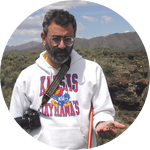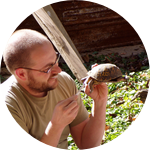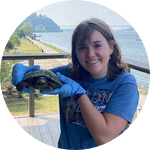About This Project
Maryland’s Northern Map Turtles (Graptemys geographica) are endangered and face many challenges that could affect their survival. Metabolomics, the study of small molecules involved in biochemical processes, is a potential tool for studying health in wild populations because it can provide information about pollutant exposure, diet, disease, and metabolism. This project will result in management recommendations such as water quality monitoring, habitat restoration, and rehabilitation.
Ask the Scientists
Join The DiscussionWhat is the context of this research?
Listed as endangered, Maryland’s Northern Map Turtles (NMTs) (Graptemys geographica) reside in an urbanized area where they face many man-made threats. The largest of these is a hydroelectric dam, which has led to significant habitat loss and separation of the population. Dam reservoirs have been shown to trap excess nutrients and pollutants, decrease biodiversity and water quality. To investigate how their habitat may be affecting their health, we can look toward the metabolome, or the composition of metabolites within a tissue. Metabolites are small molecules responsible for biological processes such metabolism and degradation and are sensitive to environmental changes. If the health and conservation of NMTs is ignored, these well-loved and iconic turtles may become extinct in Maryland.
What is the significance of this project?
My research will be conducted in Port Deposit, Maryland, where NMTs have become a local icon. Much of the research in endangered turtles focuses on marine species, despite freshwater turtles making up a large portion of all turtle species. This project will be used to inform future studies of freshwater turtle health, especially in urbanized areas. The effect of dams on wildlife health are not well understood, so these findings will contribute to studies of wildlife within these systems and aid in their conservation. Furthermore, this will contribute to our ongoing research on NMT microbiomes by providing insight into microbial function. With increased knowledge about NMT health, public participation, and improved management strategies, NMTs will flourish.
What are the goals of the project?
We aim to answer these questions:
1. What is in the metabolome? Are there differences in specific metabolites at each site?
We hope to gain a comprehensive understanding of the NMT metabolome by seeing what's there. In the process, we may detect markers of harmful substance exposure or poor health. These findings will provide information about NMT health to inform management strategies.
2. How can we use these findings to support our knowledge about the microbiome?
This project is part of ongoing research in our lab on NMT microbiomes. Microbes also release metabolites, which can provide information about their function within the body. This can be used to determine which microbes may be important for turtle health.
Budget
These funds will be used to support a Master’s project at Towson University.
Wild turtles are being collected at multiple sites along the Susquehanna River in Maryland in May-June 2024. Blood serum samples are extracted, and the turtle is rereleased. Preliminary analysis of samples (n=6) collected in 2023 suggested that the metabolome varies by location. Because of the limited sample size, accurate conclusions cannot be made. We hope to increase our sample size by 16 and have an equal number of samples per site. The budget for this project will go directly to sample processing after the field season is concluded in July 2024. 100μL of blood serum from each turtle will be sent to CreativeProteomics, who will process them using untargeted Mass-Specific Ultra High Performance Liquid Chromatography (MS-UPLC).
If we surpass our goal, extra funds will go to processing microbiome samples collected at the same time as the blood serum to see if metabolites are microbial related.
Endorsed by
 Project Timeline
Project Timeline
This project is projected to be completed in June 2025, after the thesis defense. Summer 2024 will consist of sample collection in the field, followed by data analysis in the Fall semester. I will then be working on writing my thesis and publications on my work.
Jun 20, 2024
Project Launched
Jun 30, 2024
Conclude sample collection along the Susquehanna River in Northeast Maryland
Jul 01, 2024
Send samples for processing
Jul 21, 2024
Project Launched
Aug 19, 2024
Analysis of data using computational skills (MetaboAnalyst, RStudio)
Meet the Team
Hailey Christoph
I am a Master’s Student in Biology at Towson University interested in a career in wildlife health and conservation.
Originally from the Chicago suburbs, I graduated Magna Cum Laude from Iowa State University in May of 2022 with my B.S in Biology. During my undergraduate career, I served in several research and teaching roles to diversify my experience and solidify my desire to become a scientist and educator. After graduating, I had the opportunity to work at Blank Park Zoo in Des Moines, Iowa as a Seasonal Educator. Working with exotic animals, the public, and the dedicated staff, I immersed myself into the field of conservation and instantly fell in love. After that, I worked as an Assistant Naturalist for Polk County Conservation, in Granger, Iowa. Here, I continued to spread my passion for conservation through public interaction while also gaining field skills that help me with my current research.
Steven Kimble
Turtles are among the most threatened vertebrates on the planet. With this in mind, my students and I use molecular tools such as DNA sequencing to learn things about turtles that can't be studied in other ways. For example: how many males have fathered eggs in a clutch? How far do young turtles disperse away from home? Which turtles in a population have a particular pathogen? How many turtles in a population are actually breeding? What microbes are present in a turtle's guts and what do they do in there? With the answers to these questions, population managers (such as park rangers) can make life safer for this group of vulnerable group of creatures.
Additional Information
Project Backers
- 16Backers
- 16%Funded
- $710Total Donations
- $41.76Average Donation


